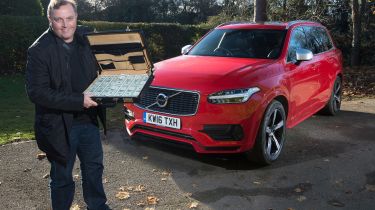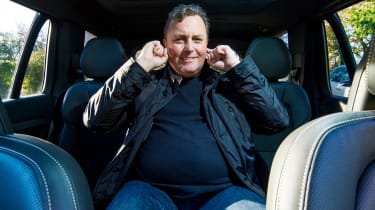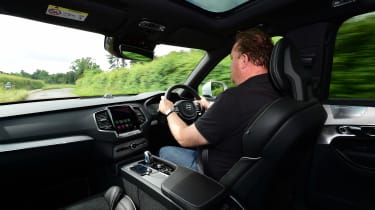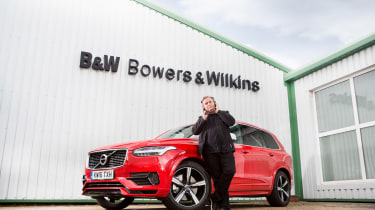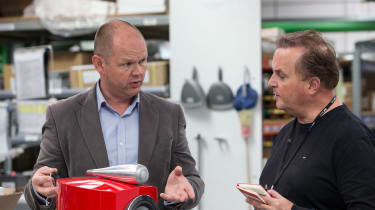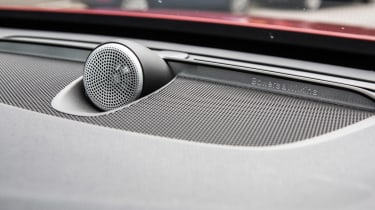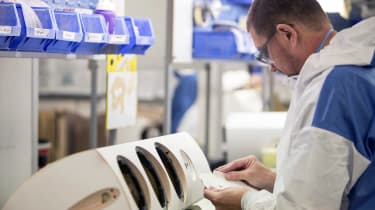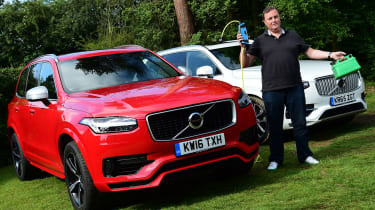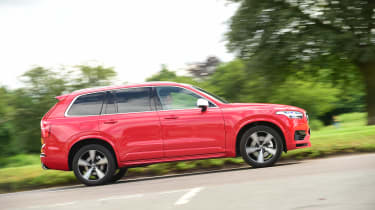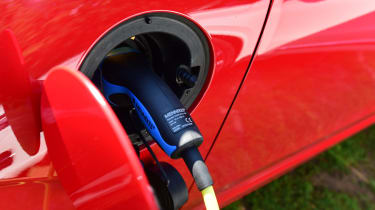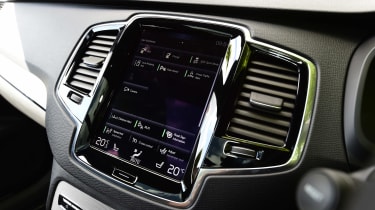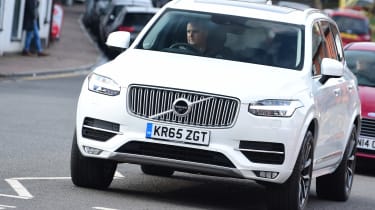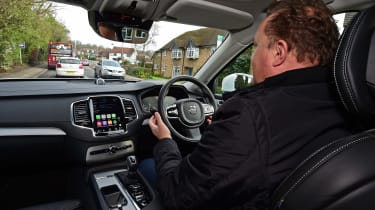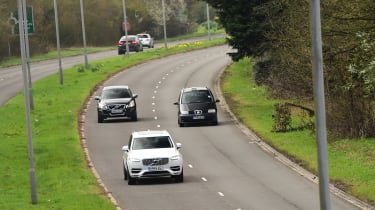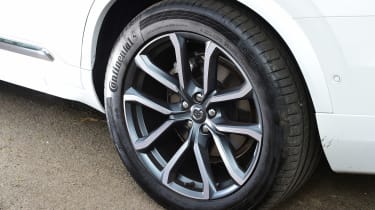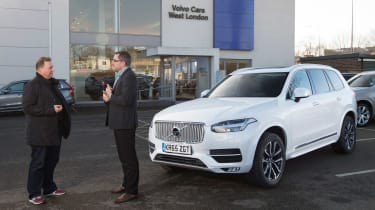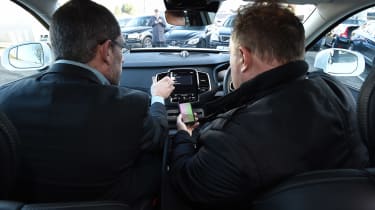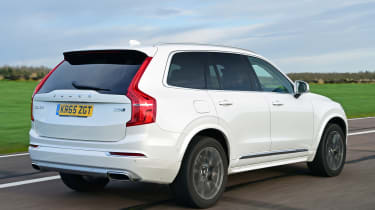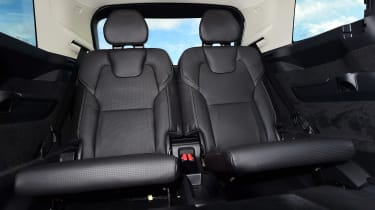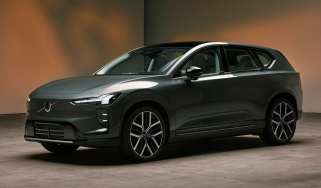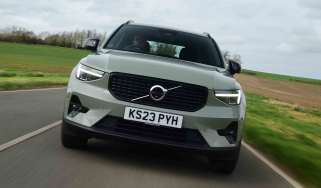Long-term test: Volvo XC90
Final report: if you or your employer has the cash, the Volvo XC90 SUV is truly brilliant
This year, the Volvo XC90 will face a tough challenge from the new Land Rover Discovery. But living with two different versions of the big Volvo over the past 12 months has shown the seven-seat XC90 still sets the standard for premium, family-friendly SUVs.
Mileage: 10,199 Economy: 38.2mpg
Over the past year, I’ve run two different versions of our current favourite large SUV, Volvo’s XC90. First came the D5 diesel; then after six months, I swapped into this T8 plug-in hybrid model.
So which is better? Sadly, it’s not clear-cut and depends how you’re going to buy it – or more to the point, who’s going to buy it.
If your company is stumping up the cash, then the plug-in hybrid is the one to go for. Thanks to its part-electric, part-petrol powertrain, it claims (emphasis on ‘claims’) 134.5mpg and 49g/km of CO2.
• Best SUVs and 4x4s on the market
However, the outdated and unrealistic official fuel economy tests weren’t designed for cars with plugs, and clearly don’t relate to efficiency in the real world. This is where we all drive – not in a laboratory – and my overall mpg figure was a disappointing 38.2mpg. The official figures for the diesel, on the other hand, are 49.6mpg and 149g/km – or in my hands, only 33mpg.
So what does that mean? Those absurd official figures for my T8 R-Design mean that you’ll save a fortune in company car tax. For the current tax year, you’ll pay £1,779 to the Treasury as a higher-rate earner.
Used - available now
If you’ve already opted for the diesel, you’d better sit down at this point because your company car tax bill on a D5 Inscription will be £6,015. That works out at an extra £353 per month for business users who choose the diesel. It’s the same as you’d save on the plug-in hybrid – assuming your company is willing to stump up the £12,505 extra for the T8 (and enjoy a tax benefit itself).
It’s a saving that’s hard to ignore, but if it’s your money buying the car, I’d save the up-front cash and go for the diesel. As much as the T8 is a delight to drive – it’s quiet, especially for the 21 miles on electric power – the D5 will go further between fill-ups and that list price saving will allow you to indulge in plenty of options. In that area, Volvo has learned from its premium rivals.
But whichever version you choose, the XC90 remains our pick of the big SUVs; it’s the car the new Land Rover Discovery has to beat, and it’ll have a tough time doing so.
Like most owners, I didn’t really test my car over rough terrain, but on tarmac, the car rides comfortably, and there’s plenty of space inside for my family of five. The two extra seats in the large boot are reasonably adult-friendly and add flexibility, too.
Sadly, though, there are bits of Volvo that are still in the past. The dealer handover wasn’t especially impressive, while towards the end of my tenure, the infotainment touchscreen became temperamental and there was a trim rattle in the rear. But whichever version you choose will be a great family SUV, and I’ll miss having one on my driveway. Lots.
Volvo XC90: fourth report
We visit Bowers & Wilkins HQ to see perfect harmony of high-end stereo and SUV
Mileage: 7,359
Mpg: 40.6mpg
Who’d have thought that good, old, safe, reliable Volvo would become a tech leader? That’s exactly what’s happened with the new range of cars, led by our 2015 Car of the Year, the XC90. And that’s what I’ve been enjoying for the past 12 months.
One of the highlights of the car is its stereo, made by British hi-fi brand Bowers & Wilkins and awarded Best Audio System for cars costing over £25,000 by our sister title Carbuyer in the Car Tech Awards.
So I decided to head to the B&W headquarters near Worthing, West Sussex, to find out about the thinking behind the 19-speaker, 1,400-Watt system in the Volvo.
The first thing that stands out once inside the Bowers & Wilkins factory is how much like a general car company the audio specialist is. The attention to detail is incredible, with senior product manager Andy Kerr and production support engineer Pete Paice showing me how B&W uses beautiful beech wood veneer in the cabinets for its 800 Series speakers. The veneer is moulded in a way that ensures the speaker cabinets are incredibly stiff, to enable better tuning of the sound. This is the same way a stiff car chassis allows engineers to better tune ride and handling.
My car’s audio system uses the Tweeter-on-Top technology also found in the wonderfully formed B&W 800 Series speakers. By separating the tweeter from a speaker cabinet or car door, it allows the sound to head straight to the listener and not be corrupted by what it sits in. It also means sound can be better directed, so you don’t get ‘reflections’ of the sound waves off something like the windscreen.
Although the tweeter domes on B&W’s 800 Series speakers are coated in platinum, those in the Volvo are aluminium and look stunning. After all, styling is a big part of its appeal and the B&W system sets off the XC90’s exquisitely crafted interior perfectly.
The yellow speakers hiding behind sleek silver grilles in the Volvo’s doors are an interesting feature, too. They’re made from advanced Kevlar, as are some of B&W’s loudspeakers. It’s not just for show, either; the weave of the Kevlar better controls the way sound waves travel around the speaker’s cone, creating a clearer sound.
It’s this attention to detail that Bowers & Wilkins is obsessive about, creating what Andy Kerr describes as “a totally natural and pure sound”. He adds: “It’s about losing less of the detail of the music.”
I can vouch for that. You hear things in music you might not have heard before, like an artist breathing or the brush of a cuff on a guitar string. It’s a powerful system, too, and not overly bassy as in many rival cars’ stereos.
As on most of my long journeys, I took advantage of the XC90’s Pilot Assist autonomous driving features on the way down to Sussex. Combining active cruise control with steering assistance to keep the car in its lane on the motorway, it really contributes to a relaxing drive, allowing me to enjoy the comfort of the XC90’s front seats, the refinement of the cabin and, of course, that superb audio system.
I love the autonomous features so much that I was frustrated on my journey home when, oddly, they were unavailable. Thankfully, it was obviously just a computer glitch, as the set-up worked fine the next day.
Volvo XC90: third report
Petrol/electric Volvo XC90 SUV replaces diesel on our fleet. So how does it compare?
Mileage: 2,310MPG: 41.4mpg
It's rare that we get to gauge the continual improvements manufacturers make to their cars over time on our fleet; we tend not to run two identical models consecutively. But when Volvo asked if we'd like to swap our XC90 D5 diesel for a T8 plug-in hybrid model six months into our year-long tenure, we jumped at the chance. Not only to experience part-electric power in our current favourite large SUV (and 2015 Car of the Year) but also to see how Volvo is tweaking the car for its latest customers.
• Volvo XC90 T8 Twin Engine review
It's the small things that you notice; the ride is marginally better than before (on the same size wheels and tyres) and the interior seems just that tiny bit more solidly built.
The tech has moved on apace, too. I've loved the autonomous Pilot Assist on my D5 at speeds of up to 30mph, but on the T8 the car will work the accelerator, brakes and guide the steering at up to 80mph (apparently). Now it works even better; it's eerily relaxing, but you find yourself naturally gripping the steering wheel slightly tigher the faster you go. The car is still doing most of the work, with the odd bit of gentle guidance.
• All you need to know about self-driving cars
The other big change is the lack of noise, and not just the petrol/electric vs diesel. The D5's engine had excellent refinement, but it can never compete with the T8.
Yet it's the lack of tyre noise I've noticed. I, like many XC90 owners, have been critical of the amount of road roar the car generates as a D5. My new T8, sitting on the same Continental rubber, is much more hushed.
I suspect that's down to the noise-cancelling tech Volvo has fitted to the T8 more than anything else the company has done. Microphones in the headlining measure the sound, with clever technology sending soundwaves through the speakers to nullify unwanted cabin noise. It ensures any extra feedback from the drivetrain is unheard, enabling you to enjoy the superb optional Bowers and Wilkins audio system, and works wonders on the tyre roar, too.
My only other gripe with the D5 was the disappointing fuel economy, although it improved to 33mph before the car left us. The T8 has an absurd efficiency claim of 134.5mpg, thanks to the even more absurd and antiquated (i.e. not designed for any cars with plugs) official tests.
My car is currently averaging 41mpg. That's not too bad, but even that figure wobbles if I don't plug in morning and night, or go for a long drive where the electric power soon disappears and is barely replenished by the regenerative braking. The £13,000 price difference between D5 and T8 puts a more negative spin on things, too.
The T8 is certainly swift when you select Performance mode - which also beefs up the steering and optional air suspension - and you put your foot down. The transition from electric to petrol is pretty seamless, too.
Yet the all-electric range of 21 miles can't even cover my one-way commute and you'd be surprised how quickly it disappears in daily running around, too. Audi's new Q7 has a much more useful plug-in range of 34 miles with an economical diesel companion.
However, the XC90's strengths of style, comfort, space, quality and tech still make the car a joy to live with. Let's see if we prefer the D5 or the T8 over the coming months.
(Note: Volvo replaced our D5 diesel XC90 with the T8 Twin Engine model in June 2016. All reports below this point refer to our previous diesel model.)
Volvo XC90: second report
Autonomous technology is making our Car of the Year a dream for commuting
Mileage: 7,507MPG: 31.6mpg
Barely a day passes when we don’t talk about autonomous driving technology at the moment – it’s the buzz phrase in the car business, with every maker working on various types and guessing when fully autonomous cars will be commonplace.
It may be something of a surprise to some to see Volvo at the cutting edge of this tech, but the XC90 on our fleet is packed with the latest kit. And at some stage every day, the car is doing some of the driving for me.
My favourite feature is Pilot Assist, which works in stop-start traffic up to 30mph. Using the cameras and radar on board, it keeps track of the car in front to know when to accelerate and brake, while also reading the white lines on the road to stay in lane. I still have to be on guard ready to take over – the car can have trouble seeing worn lines – but it’s a fine example of how this tech can take the stress out of a commute.
The adaptive cruise control gets even more use, especially on local roads with average speed cameras. I can set the system to a prescribed limit and the XC90 will once again take care of accelerating and braking. It can work up to motorway speeds and even bring the car to a complete halt and start again at the touch of a button on the wheel – all I have to do is steer.
With self-parking kit, a head-up display, keyless go and Apple CarPlay, plus the roster of advanced safety tech you expect on board, I’ve spent many hours wowing friends with my car of the future – but it's here now.
The XC90 impresses the family with its space and comfort, too, and while the 2.0-litre engine may sound small for such a big car, I‘ve never been left wanting for power. It’s clearly a four-cylinder unit when you put your foot down and hear the muted roar, but it’s more than powerful enough.
However, fuel economy is disappointing. With over 7,000 miles now on the clock I’d expected to improve on the 31.9mpg I was returning in my last report. It’s actually got worse – down to 31.6mpg. Okay, so it’s a big SUV, but it’s proving even thirstier than the 3.0-litre V6 diesel Range Rover Sport we used to run. And that’s in spite of frequent use of the (seemingly pointless) Eco Mode.
There’s one other problem that's just occurred and will need dealer attention, too. The indicators are sluggish to operate – you seem to miss the first important flash when you activate them, while nudging the stalk up or down for three blinks simply doesn't work at all.
I have my doubts that the sensors for the auto wipers are working as well; they don’t adjust their frequency depending on the amount of rain. So, an unwanted pre-service trip to the dealer will be needed soon. Seeing how Volvo’s garages cope with these issues will be interesting, as they don't normally fare too well in our Driver Power surveys.
Still, life with the XC90 is generally good right now, so let’s hope economy improves and the problems get sorted quickly so we can carry on our love affair.
Volvo XC90: first report
Classy, tech-laden Volvo XC90 is our reigning Car of the Year, and now it joins our fleet
Mileage: 3,764MPG: 31.9mpg
It’s pretty rare for my family to make too many comments about my cars, but our Volvo XC90 seems to be something of an exception. It took a matter of days for them to fall in love with it – and if my hard-to-please bunch are impressed, it must be good.
Last year we named the XC90 Car of the Year, and the attributes that won it that accolade are exactly what are impressing the Fowler family: it’s a comfortable, spacious, stylish, safe and tech-laden SUV. So over the next 12 months, I’ll be finding out if our admiration for the car is long lasting.
We started out at Volvo West London, where Alasdair Jakes gave me an expert rundown on the myriad features of the XC90. Volvo dealers haven’t done especially well in our Driver Power survey, coming 22nd last year, and I left feeling that facilities needed an upgrade if Volvo is to compete with more established premium brands.
For example, Volvo West London does its new car handovers in the car park - a world away from the drama of some in-showroom handovers, like the one experienced by road test editor James Disdale when he picked up our new Land Rover Discovery Sport recently.
My XC90 is a top-spec Inscription model fitted with a host of luxury and safety options, pushing the price up from £50,685 to £68,200. The fact that you can spend that amount on extras shows how Volvo is following the lead of other premium brands, but many of the options are things some rivals don’t offer.
As a tech fan, I had to have Apple CarPlay, self-parking, a head-up display and Queue Assist, which will drive the car itself in stop-start traffic up to 30mph. My car also has adaptive cruise control, which I’m using more than I thought I would – it makes life so easy, not only on the motorway, but as the traffic ebbs and flows on my daily commute, too.
Another thing my family has commented on is the audio system made by British hi-fi expert Bowers & Wilkins. I’m a bit of an audio nerd, yet my family has never commented on the quality of an in-car sound system before. However, they’re really impressed by the sound quality on offer, whatever we’re listening to. And it’s easy to operate via the superb touchscreen system, too.
• Full Volvo XC90 review and video
I also opted for air-suspension, which smooths out the ride. It’s not Range Rover smooth, but pretty good nonetheless. And having run Range Rovers in the past, I can confirm the Volvo matches the far pricier Brit on interior quality and beats it on tech.
Having seven seats is a real bonus for a family of five, especially with enough space for the kids not to moan if they’re asked to sit in row three. With my 15-year-old boys now six feet two tall, the excellent space in row two is more important, leaving Leia the Labrador plenty of room in the boot.
Two areas I’m not so chuffed with are the fuel economy – a disappointing 31.9mpg so far from the 2.0-litre diesel – and noise from the 20-inch Continental tyres. Volvo should consider alternatives with sound-deadening Conti Silent tech, as this is something other owners have mentioned to me, too.
Even so, the year ahead is looking good for life with the XC90. It’s proving a very easy car to live with, and a very easy car to love.
*Insurance quote (below) provided by AA (0800 107 0680) for a 42-year-old living in Banbury, Oxon, with three points.

